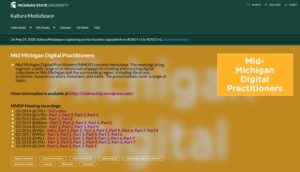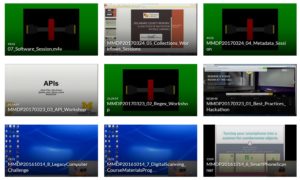The Mid-Michigan Digital Practitioners (MMDP) won a 2016 Innovation Award in the Organization category. MMDP was recognized for taking an innovative approach to providing support and guidance to the digital preservation community. The responses to this Q&A were provided by Rick Adler, Ed Busch, and Bryan Whitledge.
What have you/the project team been doing since receiving an NDSA Innovation Award?
Since receiving the award, we have continued to do what we do best – connecting archivists, librarians, curators, historians, digital humanities experts, and other kindred professionals and students across Michigan. Cultural heritage workers have  a disposition to share knowledge with others. MMDP is all about sharing knowledge and our constituency is other cultural heritage workers. We connect via our semi-annual meetings (which, thanks to support from the Library of Michigan, and other institutions, have remained free for attendees) and through our listserv list.
a disposition to share knowledge with others. MMDP is all about sharing knowledge and our constituency is other cultural heritage workers. We connect via our semi-annual meetings (which, thanks to support from the Library of Michigan, and other institutions, have remained free for attendees) and through our listserv list.
In light of the public health emergency, we didn’t hold a spring meeting, but we did hold some virtual check-ins to connect with the MMDP community and share experiences about working from home, dealing with job cuts at our institutions, or returning to the physical workspace. We are looking forward to a fully virtual fall meeting – we think that the Mid-Michigan Digital Practitioners should be able to pull off a great virtual meeting!
One effort we undertook a few years ago was to create a directory of experts. Conferences and meetings are great, and so is a listserv list, but sometimes it is nice for one person to connect with another to speak in-depth about a specific topic. The directory is a list of MMDP members who are willing to share their expertise in different skills and tools with other MMDP members on a one-on-one basis. If someone is looking for someone with policy-writing skills, we’ve got that. If another person needs some help with StoryMapJS, we’ve got that, too. And if another MMDP member needs some help cataloging Cherokee-language materials, there is an expert who can help with that!
We also have an MMDP member who led a pilot grant in Michigan to explore the creation of a statewide digital preservation network. While the MMDP wasn’t part of the grant, we definitely contributed to getting the word out across the state. MMDP members have been at the table every step of the way. The project is now moving to the next phase in creating a digital preservation network and the MMDP is one venue for sharing information about the project with the people most likely to work with it.
What did receiving the NDSA Innovation award in 2016 for MMDP mean to you and/or the project team?
Back when we started, we were an experiment… and it worked. So, the recognition was very meaningful. The award definitely raised our profile outside of Michigan. Hopefully, we have inspired other digital practitioners from around the country to form similar groups. For us, in terms of our Michigan constituency, it reinforced our conviction that what we are doing is valuable and needs to be sustained. Many of our more recent members might not know about the NDSA Innovation award, but the commitment, effort, and spirit that led NDSA to bestow the award upon us are still present in everything we strive to do for our community.
What efforts, advances, or ideas over the last 5-8 years have caught your attention or interest in the area of digital stewardship?
Lowering the barriers to entry—across the board—for digital culture. The barriers are numerous and they aren’t solely financial. The network we mentioned a moment ago is an example of that. Here in Michigan, we have some world-class institutions and they can create homegrown digital preservation environments that are second-to-none. But we also have many small historical societies with historical collections that are just as important, yet they don’t have the tools, the staff, or the finances to allow them to join a major digital-preservation endeavor. MMDP members can help to make digital preservation accessible to institutions of all stripes in Michigan. Our members have varying levels of knowhow about a wide range of digital stewardship topics (advocacy, governance, technical infrastructure skills, developing training materials, etc.), and encouraging them to share what they know expands the potential of cultural heritage professionals around Michigan. Also, we can lean on the  technological tools and skills at those institutions that support the network to make the essential technology of digital preservation accessible to all at a relatively low cost. Hopefully, through a project like this, every library, archives, museum, and historical society in the state can jump in and join the digital preservation effort. And we can get all of those historic photos off of old flash drives!
technological tools and skills at those institutions that support the network to make the essential technology of digital preservation accessible to all at a relatively low cost. Hopefully, through a project like this, every library, archives, museum, and historical society in the state can jump in and join the digital preservation effort. And we can get all of those historic photos off of old flash drives!
Another set of barriers that we hope to do away with are the limits to access that surround much of our digital cultural content. We are inspired by all of the various digital efforts across the state and the country. But there are so many fantastic resources that are buried behind paywalls and even more fantastic resources that don’t see the light of day because of the costs associated with making them available. One of our members works with cultural institutions all across the state to help them share their collection metadata through the Digital Public Library of America and a new state portal called Michigan Memories. But that isn’t enough. We also need to find resources for institutions with fantastic content but no means to host it, and help them preserve it or make it accessible with low-cost or free tools. It includes developing K-12 lesson plans and curricula supported by the freely available primary sources—we know how great this content is, but we also have to be aware that many of our target audiences are swamped with information and they might not have time to wade through hundreds of primary sources across several different platforms to develop a the perfect lesson. If we can help with that, students across the state benefit.
The MMDP project provides a great example of a regional collective that represents a wide range of libraries, archives, and museums. What successes or challenges have emerged over the now 7 years of this project?
As with any endeavor, especially one operated solely by volunteers, it can be difficult to sustain. But we have been fortunate to keep this going with new volunteers who rotate on and off our planning team as they have time. Our leadership and governance is truly 100% flexible. This means that our planning team varies in size and composition all the time. We have had planning team members tell us that their other responsibilities in life have picked up, so they have to take a break from MMDP. One year later, they are back on the planning team conference calls and recruiting speakers for our next workshop.
Overall, one of the major successes has been the low-risk opportunity for leadership afforded to our members. Becoming a member of the planning team is as simple as saying, “I would like to help.” From there, the responsibilities are divvied up as needed. When we say “low-risk,” it doesn’t necessarily mean easy or not important. Putting together a conference for 80+ attendees is no simple feat. But we have such a great group and the low-pressure nature of the MMDP really allows a new leader to learn the ins and outs without fear of failure. And, of course, the veteran MMDP members are always available as a safety net to help out as needed. Dozens of cultural heritage workers in Michigan can include a stint with MMDP’s planning team as part of their leadership experience.
We have had another success in that our efforts have been recognized by the Library of Michigan and a few of the professional organizations in Michigan for librarians, archivists, and museum professionals. We have been offered space in the Library of Michigan’s facilities to host our conferences, and we have been able to partner with other professional organizations to host a one-day workshop or a panel on digital stewardship in their conferences. It is great that other organizations and institutions in Michigan recognize that we are a special group and they support us—it allows us to keep serving anyone in Michigan looking for more information about anything and everything related to digital stewardship.
What are some priorities or challenges you see for digital stewardship?
2020 has definitely brought about many challenges in all aspects of life. Because of the current public health emergency, the resulting budget cuts, and calls for meaningful change in policies related to equity and inclusion, the priorities for digital stewardship will have to change, too. Digital cultural heritage seemed to many people like a nice “extra” thing in their lives. With remote learning, we saw how digital cultural heritage immediately became a necessity for students. And it became a comfort for people looking for a moment of peace—they could explore a museum’s holdings through a public-facing DAM or do some genealogy using digital newspapers. We also need to take stock of the work we are doing and how it can best serve all of our communities, which may mean reorienting some of the priorities we defined before March of 2020.
In light of the seismic upheavals on many fronts, MMDP foresees tough times in trying to execute our priority of continuing to facilitate the sharing of digital stewardship information among our members. With tightening budgets on the horizon and more demands for digital cultural heritage, our members need to be able to get the most out of the limited time and funds that we have. There are so many new tools, new initiatives, and new skills—every one of us could spend a lifetime learning about them (and spend a ton of money in the process). By sharing some information and offering advice like “try this, and avoid that,” we hopefully can save people a lot of time, effort, and money to accomplish their digital stewardship goals.
Another priority will be to continue to lower the barriers to entry to digital stewardship. Michigan is a big state with a wide variety of needs in that realm. MMDP is one helpful piece in a larger puzzle of knowledge-sharing and collaboration that will be needed to ensure that Michigan’s cultural heritage is preserved and made accessible to the people who could use it.
